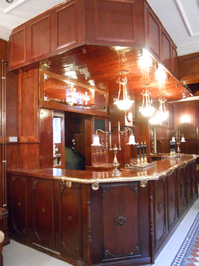Family brewer keeps the flag flying
Added: Saturday, October 20th 2012
What would you do if you’re a family brewer in a largely rural area where the local population is made up of mainly poorly-paid farm workers? Reach for the suicide pill?
In the past 40 years, many family brewers faced by similar problems pulled down the shutters. In the 1970s there were 82 family brewers. Today the number stands at just 30. They used to be a power in the land. Now they are ground between the mighty global brewers, the pubcos and the blossoming small brewery sector.
Fortunately, George Bateman & Son, based in Wainfleet in Lincolnshire and founded in 1874, has a sturdy backbone and a passion for brewing. It’s carving out new ways of staying in business, based on refreshing its portfolio of beers and overhauling its estate of 69 pubs.
Back in the 1980s, Batemans looked like becoming yet one more footnote in the history of British brewing. The family was split. Two members thought there was no future for a small company in an industry increasingly dominated by national brewers. They wanted to sell up and retire.
But chairman George Bateman, his wife Pat and their children Stuart and Jaclyn were determined to keep going. Following a long struggle, the money was raised to buy out their relatives and the brewery was saved.
Today Stuart and Jaclyn are at the helm and they have brought a feisty new interpretation of brewing and retailing to play in Wainfleet. While marketing director Jaclyn busily sells beer to the free trade and to the U.S., Russia, Finland and Sweden, managing director Stuart and his team look after the home patch, where beer drinking has changed dramatically in recent years.
Boston has 23 Bateman’s pubs and is a vital hub of the business. It has a large population of immigrants from all parts of Europe, who work mainly on the land, and the brewery has had to refashion some of its pubs to meet their needs.
Stuart Bateman has to source beers from Poland and other eastern European countries for customers who wouldn’t let a drop of Dark Mild pass their lips. One Boston pub has been turned into a Portuguese bar run by managers from that country.
But it’s not just new arrivals from Europe who have different demands for beer. Ten years ago, Batemans opened a new multi-functional brewhouse that allows them to produce 27,000 barrels a year and to extend the range of beers. Stuart Bateman frankly admits that sales of his sturdy traditional bitters, XB and XXXB, have fallen and he has filled the gap with new regular and seasonal brews.
Yella Belly Gold, introduced in the summer, is flying out of the brewery. Head brewer Martin Cullimore gave me tasters of two new beers, a Dutch strong Bock brewed in collaboration with the T’ji craft brewery in Amsterdam, and Mocha. The last named is brewed with the addition of Arabica coffee beans and Belgian chocolate and the bottled version was named champion beer in Sainsbury’s Great British Beer Hunt 2012 (see post on this site). Cullimore is also working on plans for a wheat beer and tackling the problem that wheat is a difficult grain to brew with and can gum up the entire works.
Stuart Bateman is tackling another other pressing problem known as bums on seats. He not only has to attract people to his pubs but he also needs happy and satisfied people working behind the bar. To this end, he has broken the ancient mould of the tied house agreement by allowing 24 of his tenants to become, in effect, free traders.
“Too many tenants work for less than the minimum wage,” Bateman says. “Those on the new agreements pay no wet rents and most of them are now better off to the tune of £7,000 each a year.” The publican buys beer at free trade prices and the brewery sets an annual barrelage target that’s fair to both sides. The result, Bateman says, has been a substantial increase in beer sold in most of the pubs that have opted for the new scheme.
The brewery also helps publicans develop new income streams. Stuart Bateman showed me several pubs with substantial outbuildings that will be turned into holiday flats. Pubs next to open land will, with planning permission, have caravan sites added.
In Boston, pubs are busily being improved for the indigenous population as well as incomers. The Carpenters Arms is almost lost in a maze of back streets but attracts a wide range of customers, many of whom come to play darts. It’s multi-roomed, warm, comfortable and welcoming, and sells guest beers as well as the Bateman’s range.
An astonishing transformation is taking place in a pub down a narrow lane just off the market place. The Indian Queen & Three Kings (pictured top) was once a rockers’ pub but is being turned, at a cost of £36,000, into a Victorian tavern with wood-panelling, open fires, tiled floors and gas lamps.
Back in Wainfleet, Batemans is faced by boarded-up shops and a derelict pub -- not one of theirs. It's a sad site but I wouldn’t put it past Stuart Bateman to bring it back to life.
*First published in the Publican’s Morning Advertiser, 18 October.








